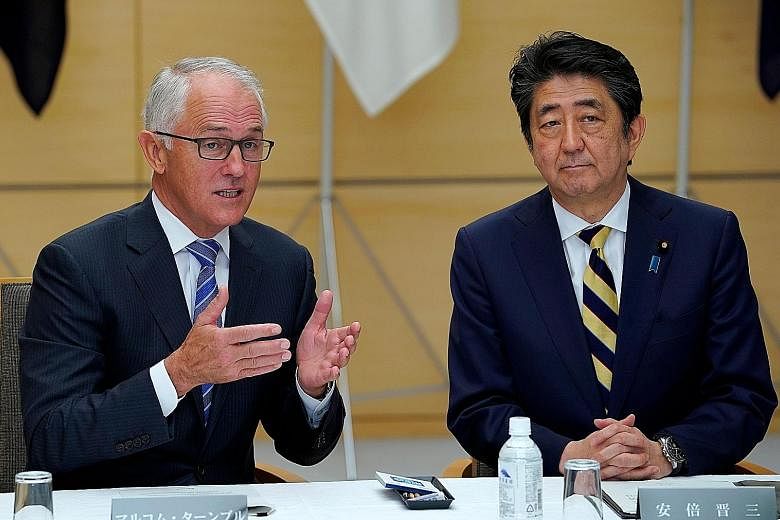Japanese Prime Minister Shinzo Abe will likely discuss how Japan can work with China to meet Asia's infrastructure needs in a policy speech in Parliament today.
His speech to open this year's Parliament session also looks set to cover the government's labour reform plans to tackle issues such as karoshi, or death by overwork, public broadcaster NHK has reported. These are among the top issues on Mr Abe's agenda for the year.
In September, Mr Abe faces an internal party vote that will determine if he will carry on as Liberal Democratic Party (LDP) president for a third three-year term. The leader of the ruling political party has, in most cases, assumed the role of prime minister.
Before the vote, he hopes to meet Chinese President Xi Jinping in Beijing and get him to make a reciprocal visit to Tokyo. Japan also hopes to hold the long-delayed trilateral summit with China and South Korea this year.
While Tokyo was initially sceptical about China's ambitious Belt and Road Initiative (BRI), Mr Abe has since said Japan will consider joining projects on a "case-by-case basis".
Tokyo will likely stand ready to support BRI projects that meet fair procurement and debt sustainability standards, which the NHK report said was in line with Japan's "Free and Open Indo-Pacific Strategy".
This strategy has been seen by some observers as a counter to China's expanding sphere of economic and military influence in the region. But NHK said: "It is Japan's policy to cooperate with China to respond to Asian infrastructural demand along this direction of promoting peace and prosperity in the region based on freedom of navigation and rule of law."
On North Korea, Mr Abe will direct Parliament to consider further means to boost Japan's ballistic missile defence systems.
As for domestic policy, Mr Abe is set to push for labour reforms, including a cap on overtime hours of no more than 45 hours a month in principle - and 100 hours a month during peak periods, up to 720 hours a year.
He also wants to push for a results-and productivity-driven workplace, as opposed to one that is judged solely by the number of hours clocked at work, so as to promote more flexi-work arrangements.
And to uplift the swelling ranks of so-called "irregular" contract-based workers who are paid less and given fewer benefits than their full-time counterparts, Mr Abe may lay out policies that promote "equal pay for equal work".
He will also address demographic concerns, including the rapidly ageing society and low birth rates, by rolling out a "social security system for all generations" that invests more in support for childcare and education.
The focus on the working-age population and their children comes as Japan reported that the 941,000 births last year was the lowest since record-keeping began in 1899.
Political scientist Harukata Takenaka from the National Graduate Institute for Policy Studies in Tokyo said he is hopeful of a recovery in Japan's total fertility rate, which stood at 1.44 in 2016, following the new measures to support the younger generation.
There is also Mr Abe's cherished goal to revise the 70-year-old Constitution that renounces war. It has proven divisive even in the LDP.
But a Kyodo poll on Jan 12 showed that 54.8 per cent of those polled opposed to a revision, up 6.2 points from last month.
Amending the Constitution requires the support of two-thirds of lawmakers in both the Lower and Upper Houses of Parliament and a majority vote in a national referendum.
Dr Takenaka noted that the ruling coalition's current two-third majority in both Houses may be at stake in the next Upper House election, slated for July next year.
As such, Mr Abe's "last window of opportunity appears to be shrinking", given Emperor Akihito's impending abdication on April 30 next year, he said.
"It is difficult to imagine that Mr Abe will push for any moves that might split the country into two over the Constitution before the Emperor steps down," he added.
"But given the state of the opposition today, he may feel confident enough to wait until 2020."

